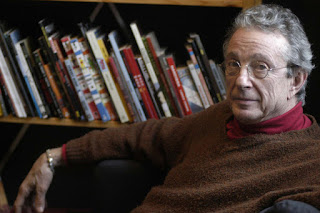Don't speak ill of the dead (even poets), but repetitively and at some length, if it might honor them in their own way
http://www.nytimes.com/2015/09/21/books/c-k-williams-poet-who-tackled-moral-issues-dies-at-78.html
Satirical Elegy In Memoriam C.K. Williams
The death of another honored American poet, of course, does not put much of a dent in the American preoccupation with the sort of thing that irritated him no end
And I do mean "no end," as this was a bard who could seem to go on and on even in a short poem, especially one that was cast in long lines
Even looser and baggier than Walt Whitman's (his idol's) at his loosest and baggiest.
He was capable of discipline, but distrusted it as if there was something dishonest about leaving things out, so that focus for him meant only that stuff (read: "everything")
Which lay in or near the path of "this entity I call my mind, this hive of restlessness, this wedge of want my mind calls self, this self which doubts so much and which keeps reaching," was in play.
But I must interrupt this opening "stanza" of "The Clause," which is on page 58 of the only Williams volume I own, "The Singing," to give even this parody some appearance of suitability for blogging.
Still, what I quoted will lend you an idea of how our deceased poet, and I will not make light of his demise at 78 from the lingering agony of multiple myeloma, wrote:
As if every crossed-out phrase in his first draft had to be restored, because it deserved to be in the final poem as much as what came to him before or after it.
And besides allowing himself equalized treatment of several different ways of saying the same thing, set out in a glum parade,
He was convincing the reader that sudden, bizarre shifts of focus wouldn't matter as long as the overarching thought was serious enough, as in "The Hearth,"
Where the odd slowness to burn of a plastic coffee cup tossed upon kindling (it is "reluctant," "somehow uncertain what to do") reminds him
Of a friend talking about being severely burned by napalm, who in the telling "made it sound something like that," and from there we go to
An owl observed on the hunt, which unsurprisingly brings to mind war and the people who cause it, which is a move a poet can always
Count on to assure the reader he (or she) is not just stirring the embers of his (or her) own paltry life, but is engaged with the world's sorrows,
And that your concern for those won't suffer you, even when you write neat stanzas from time to time, to suffer any less than the reader,
Who will eventually be able to rest in peace — temporarily, by putting the book down; then permanently, like the honored American poet C.K. Williams.
Satirical Elegy In Memoriam C.K. Williams
 |
| C.K. Williams found his second and third thoughts as valid as his first. |
The death of another honored American poet, of course, does not put much of a dent in the American preoccupation with the sort of thing that irritated him no end
And I do mean "no end," as this was a bard who could seem to go on and on even in a short poem, especially one that was cast in long lines
Even looser and baggier than Walt Whitman's (his idol's) at his loosest and baggiest.
He was capable of discipline, but distrusted it as if there was something dishonest about leaving things out, so that focus for him meant only that stuff (read: "everything")
Which lay in or near the path of "this entity I call my mind, this hive of restlessness, this wedge of want my mind calls self, this self which doubts so much and which keeps reaching," was in play.
But I must interrupt this opening "stanza" of "The Clause," which is on page 58 of the only Williams volume I own, "The Singing," to give even this parody some appearance of suitability for blogging.
Still, what I quoted will lend you an idea of how our deceased poet, and I will not make light of his demise at 78 from the lingering agony of multiple myeloma, wrote:
As if every crossed-out phrase in his first draft had to be restored, because it deserved to be in the final poem as much as what came to him before or after it.
And besides allowing himself equalized treatment of several different ways of saying the same thing, set out in a glum parade,
He was convincing the reader that sudden, bizarre shifts of focus wouldn't matter as long as the overarching thought was serious enough, as in "The Hearth,"
Where the odd slowness to burn of a plastic coffee cup tossed upon kindling (it is "reluctant," "somehow uncertain what to do") reminds him
Of a friend talking about being severely burned by napalm, who in the telling "made it sound something like that," and from there we go to
An owl observed on the hunt, which unsurprisingly brings to mind war and the people who cause it, which is a move a poet can always
Count on to assure the reader he (or she) is not just stirring the embers of his (or her) own paltry life, but is engaged with the world's sorrows,
And that your concern for those won't suffer you, even when you write neat stanzas from time to time, to suffer any less than the reader,
Who will eventually be able to rest in peace — temporarily, by putting the book down; then permanently, like the honored American poet C.K. Williams.



Comments
Post a Comment